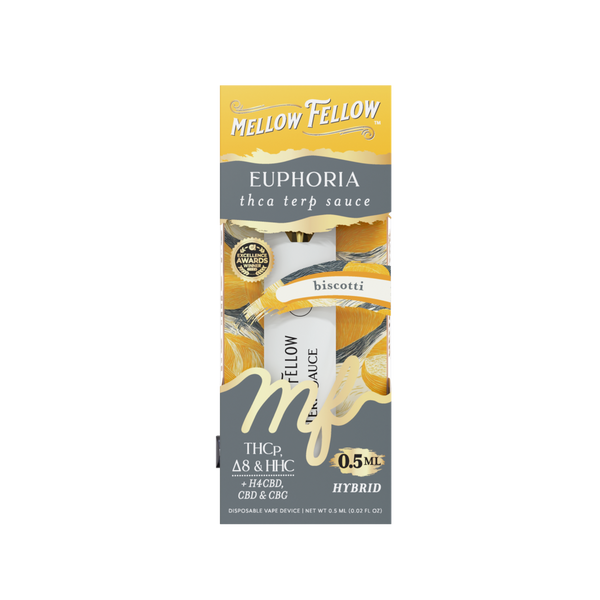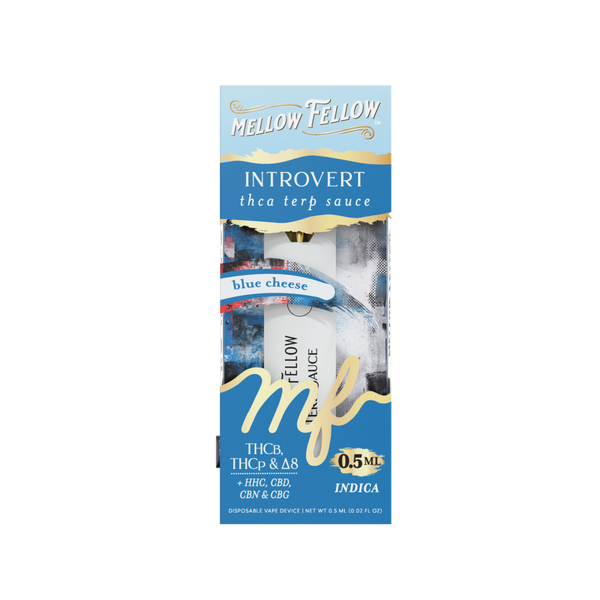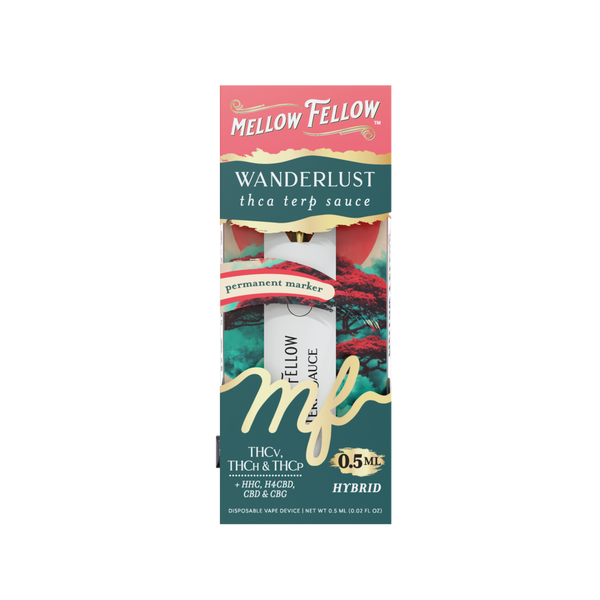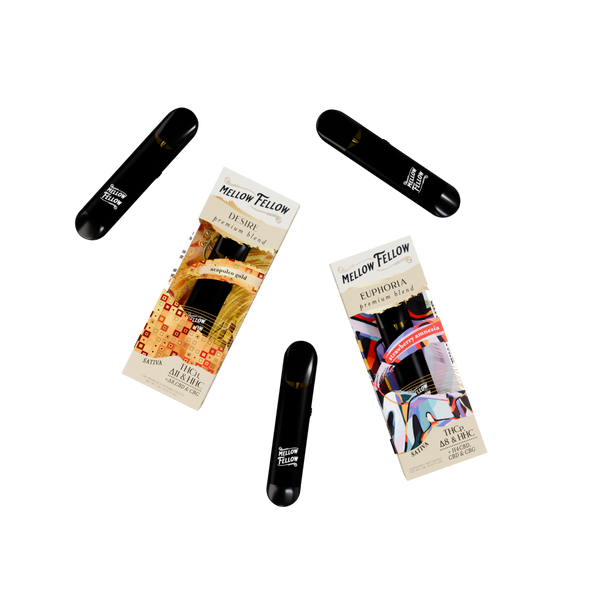THCa vs. THCp: Comparing the Differences

Staying up-to-date on the latest in cannabis technology can be daunting, especially with so many new products and cannabinoids popping up all over the country. You may be thinking, “Can’t we just leave it at regular THC?” but we argue that these discoveries are a long time coming and can be pretty exciting.
We all know Delta-9 THC, the most famous cannabinoid (alongside its non-psychoactive cousin, CBD). Delta-9 THC is guilty of creating psychoactive experiences in people who consume weed, but it’s not the only THC cannabinoid.
Let’s jump into THCa and THCP, two cannabinoids that are causing a scene in the cannabis world. At Mellow Fellow, we pride ourselves on keeping up with the latest and greatest in cannabis innovation, so join us as we take a deep dive into some of the cannabinoids you’ll find in our products.
Key Takeaways
- THCa is a non-psychoactive precursor to Delta 9 THC, while THCP is a psychoactive cannabinoid with unique effects. Understanding the differences between these two cannabinoids is crucial for informed cannabis consumption.
- Despite being non-psychoactive, THCa is gaining popularity for its potential therapeutic benefits. It is available in various products like raw cannabis juices, tinctures, pills, and lotions.
- THCP is a potent psychoactive cannabinoid that can lead to effects similar to Delta 9 THC, including altered perception, euphoria, relaxation, and increased appetite. Due to its unique chemical structure, it's considered more potent.
Looking to try the latest THCa and THCP products? Check out Mellow Fellow’s premium collection for high-quality options. Shop our THCP here today.
THCa vs. THCP
Holding secrets to understanding the potential of this beloved plant, THCa (tetrahydrocannabinolic acid) and THCP (tetrahydrocannabiphorol) are two cannabinoids found in cannabis. THCa is a non-psychoactive precursor to Delta 9 THC, while THCP is a potent psychoactive with a similar structure to Delta 9.
While they might have similar names, it’s important to know the difference between the two to make informed choices, especially if you’re curious about delving into the world of minor cannabinoids.
Why? Because the latest cannabis trends lean towards the exploration of lesser-known cannabinoids that can have varying effects. Knowledge is empowering, and by discovering what THCa and THCP have to offer, you can make the best decision based on your needs and wishes.
What is THCa?
THCa’s chemical structure is similar to its psychoactive cousin, THC. A key difference in a carboxyl group rends it non-psychoactive, yet the potential benefits make it an intriguing cannabinoid to explore.
This cannabinoid forms naturally in the plant’s trichomes, creating crystal-like structures on the flowers, leaves, and stems, essentially becoming cannabinoid factories (where THCa and others are formed).
Raw cannabis is rich in THCa because as soon as it’s exposed to heat (in a lit joint, for example), it converts to the Delta 9 THC we all know and love. THCa is only available in raw cannabis, as the carboxyl group is detached when exposed to heat.
Benefits and Uses of THCa
There’s no denying the growing interest in THCa’s potential benefits and uses. Although it’s non-psychoactive, THCa offers many intriguing possibilities for people. Studies are still discovering the hidden uses of this cannabinoid, but THCa products have already become a go-to for those seeking natural wellness options.
Research suggests that THCa exhibits significant anti-inflammatory properties and may improve glucose tolerance and reduce liver fibrosis in high-fat diet-induced models. Studies have shown its potential in managing inflammation, pain, and metabolic disorders.
THCa is found in a variety of products, often in unheated raw cannabis juices, tinctures, pills, and lotions.
Although they won’t give you that typical “high” you might experience from psychoactive cannabinoids, many people turn to this compound due to claims of pain and nausea reduction and general well-being.

What is THCp?
THCp is tetrahydrocannabiphorol, another chemical cousin of regular Delta 9 THC. In contrast to THCa, THCp is psychoactive and can get you high. Because of an elongated carbon side chain, it sets itself apart from the main compound, and that small difference can cause unique effects.
THCp isn’t in every plant, instead being found in trace amounts in some specific strains (especially in European strains), leading THCp products to be in high demand.
Potency and Effects of THCp
The unique chemical structure of THCp suggests that this cannabinoid strongly binds to CB1 and CB2 receptors in the endocannabinoid system, making for more potent effects.
Early research indicates that THCp binds to CB1 receptors up to 33 times more effectively than delta-9 THC, which could explain its significantly higher potency. This unique binding affinity leads to stronger psychoactive effects even in small doses.
Anything potent in the cannabis world will always be a point of interest, which is why you might see THCp products showing up at your local dispensary.
The potential effects of THCp are similar to those of Delta 9 THC: altered perception, euphoria, relaxation, increased appetite, creativity, and focus, among other common effects. On the less fun side, just like any psychoactive substance, it may cause anxiety or discomfort in some people.
To understand the differences between THCP and other cannabinoids like THCjd, read our comprehensive blog, THCjd vs. THCP. Gain insight into their potential applications and effects.
Where to Find THCp Products
If you’re looking for THCp products that offer safe and reliable cannabis experiences, you’ll want to take a look at our stash at Mellow Fellow. We like to know we know what we’re doing: our team is formed by a group of people with decades of experience in chemistry, pharmaceuticals, and cannabis.
Not only do we deal in THCp, but we also make an effort to mix and match different cannabinoids for a full-spectrum experience.
If vapes are your thing, try out our THCp-packed Dali’s Dream Blend Disposable Vape, or if you want something disposable with some extra potency, you’ll find live resin in our Euphoria Blend live resin disposables, available in Strawberry Amnesia and Green Crack.
Out of the edibles realm, Mellow Fellow also provides some of the best edibles, pre-rolls, and novelty products. You’ll be entranced after a couple of bites of our Banksy’s Introvert Blend Cereal Bar, infused with THCp, HHC, Delta 8, and other cannabinoids. If you do not have a sweet tooth, check out Picasso’s Euphora Pre-Rolls to skip the rolling process.
If you’re looking for a truly potent THCp experience, Dali’s Dream Blend Diamonds is the way to go. This Legend OG strain is in crystal form, with a super high cannabinoid content that can lead to a very potent experience.
Related Products
THCp vs. THCa Isomers
Chemical Structures Compared
Both THCa and THCp are isomers that have taken the world by storm, but what constitutes the difference behind similar chemical structures? Although they share a common foundation, small distinctions make for different effects and applications.
Here are some key differences between the two:
THCa
- The “a” in THCa isn’t decorative; it stands for acid, which indicates the presence of a carboxylic acid group (COOH) in the chemical structure. This is the key difference that keeps THCa non-psychoactive. Once the acid is exposed to heat or light, the structure changes, and it becomes THC.
- The non-psychoactive nature of THCa is due to the fact that this cannabinoid represents cannabis in its raw form. As long as it’s not exposed to heat or light, it continues to be non-psychoactive.
THCp
- THCp molecules are equipped with a longer carbon sidechain than their other THC counterparts, and this key difference is enough to deliver a unique psychoactive experience.
- THCp is thought to have the potential for increased potency due to its unique structure. Because of the elongated carbon sidechain, this cannabinoid binds more strongly to cannabinoid receptors and can lead to more pronounced effects.
Is THCa Stronger Than THCp?
It’s hard to say whether THCa or THCp is stronger because their uses and effects are so different. The case could be made that THCp is stronger due to its psychoactive effects, which can make the non-psychoactive effects seem mild in comparison.
However, you could also make the case that a THCa flower with a high THC content, once exposed to heat, can be more potent than a THCp counterpart. Still, the general consensus is that THCp is a more potent cannabinoid than THCa (potentially even more potent than Delta 9 THC).
While THCp can lead to effects that you recognize as cannabis psychoactivity and THCa doesn’t, they are used in different ways. THCa is often favored by those looking for therapeutic relief, while THCp-seekers might be in it for the thrill.
Therapeutic Benefits: Which is Better?
When determining which cannabinoid is right for you, it’s important to dig deep into the potential benefits and effects that they each have. Cannabis has long been turned to as a therapeutic aid, and its rising popularity has paved the way for a rising trend in minor cannabinoid products.
THCa's potent anti-inflammatory activity has been highlighted in studies that show its ability to reduce expression of inflammatory molecules and improve metabolic health in animal models. Conversely, THCp's strong psychoactive effects may offer unique therapeutic benefits in pain management and mood enhancement due to its high binding affinity to cannabinoid receptors.
While it’s important to note that scientific research is still underway, and we can’t make any conclusions, some users have hailed THCa for its potential benefits, including an improvement in pain relief, anti-inflammatory properties, and neuroprotective potential.
The psychoactivity of THCp doesn’t cancel out potential benefits, though, with some people turning to this cannabinoid to explore its potential pain-relieving properties.
THCa or THCp: Which One is Safer?
There’s still a lot to be researched when it comes to cannabinoids, especially novel ones like THCp and THCa. As they start gaining traction, it’s important to consume responsibly, whether or not it’s psychoactive.
The limited research means we don’t know about long-term effects yet, but there are things brands are doing to ensure safety.
Making sure to stick to reputable brands that are backed by happy customers is important, almost as much as making sure licensed producers are transparent about business practices and processes and go through with third-party lab testing.
Making sure you only purchase from safe brands, consulting with healthcare professionals, consuming responsibly, staying informed, and listening to your body are the keys to ensuring a valuable and safe cannabis experience.
Final Thoughts
As the rise of cannabinoids like THCa and THCp continues, we’re left to keep up with the unique cannabis experiences they provide.
These two couldn’t be more different, although they share a similar chemical structure: THCa may have potential therapeutic benefits without the psychoactivity, while THCp may have different benefits and deliver a potent psychoactive experience.
The exploration of these cannabinoids is far from over.
The future of THCa and THCp is exciting as it allows the cannabis world to make advancements in research to discover more about potential therapeutic benefits and effects, diversify cannabinoid products, develop new technologies and regulations to ensure product safety and consumer protection, and have a chance to educate an entire generation by providing accurate and accessible information.
Ready to explore the unique benefits of THCa and THCp? Peruse our top-tier products at Mellow Fellow and enhance your cannabis experience. Find our THCp products here.
THCp vs. THCa: Frequently Asked Questions
What's the Difference Between THCa and THCp?
While they share a similar structure, THCa is a non-psychoactive precursor to Delta 9 THC, while THCp is a minor cannabinoid with psychoactive abilities.
How do THCa and THCp Relate to Other Cannabinoids like THC and CBD?
Both THCa and THCp are some of the 100+ cannabinoids in cannabis. THCa is the precursor to Delta 9 THC, while THCp is similar to the latter, with a slightly unique structure.
What are Some Potential Benefits of Consuming THCa and THCp?
Although limited research is available, some people are turning to THCa and THCp to explore potential therapeutic benefits relating to pain relief and relaxation.
Are there any Risks Associated with Consuming THCa and THCp?
Similar risks apply to THCa and THCp than other, more mainstream cannabis products. It’s important to find reputable products and consume them responsibly to reduce the risk of side effects.
Where Can I Find Reliable and Safe Products Containing THCa and THCp?
You can find tons of safe, reliable, and effective THCp products at Mellow Fellow.
Sources Used in This Article:
1 comment
Explore Other Articles
View allExplore more
- 11 hydroxy thc
- Blends
- blunt
- burn blend
- cannabinoids
- cartridge
- CBD
- cbg
- CBN
- Charged Blend
- Clarity Blend
- Concentrates
- Connection Blend
- Creativity Blend
- Dabs
- decarb
- decarboxylation
- delta
- delta 10
- delta 11
- delta 8
- Delta 8 thc
- delta 9
- delta 9 thc
- Delta-10-THC
- Delta-11-THC
- delta-8
- Delta-8-THC
- Delta-9-THC
- delta9
- Desire Blend
- destination series
- Diamonds
- disposable
- disposable vape
- Dream Blend
- dry january
- edibles
- elevate blend
- entourage
- entourage effect
- entourage effects
- Euphoria Blend
- focus
- gummies
- H4CBD
- halloween
- hemp
- hemp-derived
- HHC
- HHCp
- HTE
- Indica
- Introvert Blend
- Joint
- lean
- legal
- Live Resin
- Live Resin cartridges
- m-fusions
- mechoulam
- momentum blend
- Motivation Blend
- one hitter
- preroll
- productivity
- raphael mechoulam
- Recover Blend
- Relief
- sleep
- strain review
- terp sauce
- Terpenes
- Thanksgiving
- thc
- THC beverage
- THC Drink
- thc lean
- thc-p
- THCa
- THCa Flower
- THCb
- THCh
- THCm
- thcp
- THCp edibles
- THCp flower
- THCv
- the elevate blend
- The Energy Blend
- The Happy Blend
- The Illuminate blend
- the momentum blend
- The Rest Blend
- Tranquility Blend
- vape
- vape cartridge
- Vapes
- wax
- wellness
- zkittlez



















I like the way thcp makes behind my eyeballs feel good. And my eyes get red and heavy. Thcp is great when I have to be away from Colorado and the real stuff.
Leave a comment